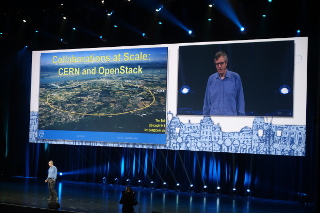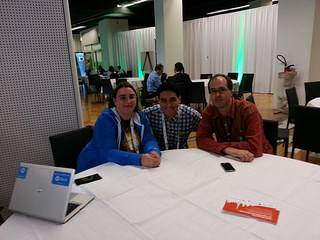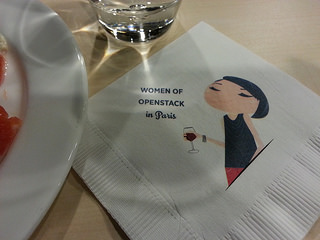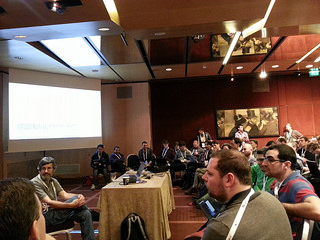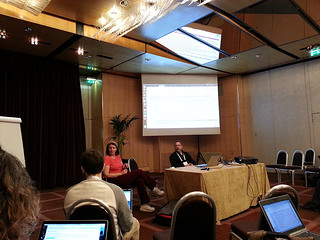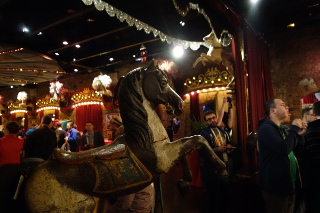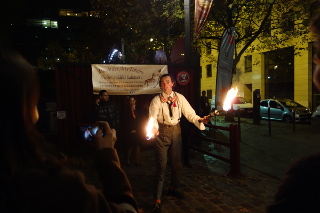Saturday morning I arrived in Paris. The weather was gorgeous and I had a wonderful tourist day visiting some of the key sights of the city. I will write about that once I’m home and can upload all my photos, for now I am going to talk about the first couple of days of the OpenStack Summit, which began on Monday.
Both days kicked off with keynotes. While my work focuses on the infrastructure for the OpenStack project itself and I’m not strictly building components of OpenStack that people are deploying, the keynotes are still an inspiration. Companies from around the world get up on the stage and share how they’re using OpenStack to enable their developers to be more innovative by getting them development environments more quickly or how they’re putting serious production load on them in the processing of big data. This year they had BBVA, BMW (along with a stunning i8 driven onto the stage), Time Warner Cable, CERN, Expedia and Tapjoy get up on stage to share their stories.
CERN’s story was probably my favorite (even if the BMW on stage was shiny and I want one). Like many in my field, I hold a hobbyist level interest in science and could geek out about the work being done at CERN for days. Plus, they’re solving some really exceptional problems around massive amounts of big data produced by the LHC using OpenStack and a pile of other open source software.
It was exciting to learn that they’re currently running 4 clusters using the latest release of OpenStack, the largest of which has over 70,000 cores across over 3,000 servers. Pretty serious stuff! He also shared some great links during his talk, including:
I was also delighted to see Jim Zemlin, Executive Director of the Linux Foundation, get on stage on the first day to share his excitement about the success of OpenStack and to tell us all what we wanted to hear: we’re doing great work for open source and are on the right side of history.
In short, the keynotes spoke to both my professional pride in what we’re all working on and the humanitarian and democratization side of technology that so seriously drew me into the possibilities of open source in the first place.
All the keynotes for both days are already online, you can check them out in this youtube playlist: OpenStack Summit Paris 2014 Keynote Presentations
Back to Monday, I headed over to the other venue to attend a session in the Ops Summit, “Top 10 Pain points from the user survey – how to fix them?” The session began by looking at results from the survey released that day: OpenStack User Survey Insights: November 2014. From that survey, they picked the top-cited issues that operations are having with OpenStack and worked to come up with some concrete issues that the operators could pass along to developers. Much of the discussion ended up focusing on problems with Neutron (including problems with the default configuration) and gaps in Documentation that made it difficult for operators to know that features existed or how to use them. The etherpad for the session goes further into depth about these and other issues raised and added during the session, see it here.
Monday afternoon I met up with Carlos Munoz of Red Hat and Andreas Jaeger of SUSE who I’ve been working with over these past couple of months to do an in depth exploration of our options for a new translations system. We have been evaluating both Pootle and Zanata, and though my preference had been Pootle because of it being written in Python and apparent popularity with other open source projects, the Translations team overwhelmingly preferred Zanata. As Andreas and I went through the Translations Infrastructure we currently have, it was also clear that Zanata was our best option. It was a great meeting, and I’m looking forward to the Translations Tools Session on Thursday at 11AM where we discuss these results with the rest of the Infrastructure team and work out some next steps.
From there I went down to the HP Sponsored track where lighting talks were being run during the last two sessions of the day. The room was packed! There were a lot of great presentations which I hope were recorded since I missed the first few. My talk was one of the last, and with a glowing introduction from my boss I gave a 5 minute whirlwind description of elastic-recheck. I fear the jetlag made my talk a bit weaker than I intended, but I was delighted to have 3 separate conversations about elastic-recheck and general failure tracking on CI systems that evening with people from different companies trying to do something similar. My slides are available here: Automated failure aggregation & detection with elastic-recheck slides (pdf).
On Tuesday morning I was up bright and early for the Women of OpenStack breakfast. Waking up with a headache made me tempted to skip it, but I’m glad I didn’t. The event kicked off with some stats from a recent poll of members of the Women of OpenStack LinkedIn group. It was nice to see that 50% of those who responded were OpenStack ATCs (Active Technical Contributor) and many of those who weren’t identified themselves as having other technical roles (not that I don’t value non-technical women in our midst, but the technical ones are My Tribe!).
Following the results summaries, we split into 4 groups to talk about some of the challenges facing us as a minority in the OpenStack community and came up with 4 problems and solutions: Coaching for building confidence, increasing profile and communication for and around the Women of OpenStack group, working to get more women in our community doing public speaking and helping women rejoin the community after a gap in involvement (bonus: this can directly help men too, but more women go through it when taking time off for children). The group decided on focusing on getting the word out about the community for now, seeking to improve our communication mechanisms and see about profiling some women in our community, as well as creating some space where we can put our basic information about what we’re working on and how to contact us. I was really happy with how this session went, kudos to all the amazing women who I got to interact with there, and sorry for being so shy!
After keynotes, I headed back over to the Design Summit venue to attend a couple cross-project testing-focused sessions: “DefCore, RefStack, Interoperability, and Tempest” (etherpad here) and Moving Functional Tests to Projects (etherpad here). One of the most valuable things I got out of these sessions was that projects really need to do a better job of communicating directly with each other. Currently so much is funneled through the Quality Assurance team (and Infrastructure team) because they run the test harness where things fail. Instead, it would be great to see some more direct communication between these projects, and splitting out some of the functional tests may be one way to help socially engineer this.
Following lunch and a quick meeting, I was off to “Changes to our Requirements Management Policy” (etherpad here) and then “Log Rationalization” (etherpad here). There seemed to be more work accomplished on the latter, which was nice to see since there’s a stalled specification up that it would be great to see moved along so that the project can come up with some guidelines for log levels. Operators have been reporting both that they often run logging at DEBUG level all the time so they can see even some of the more basic problems that crop up, AND are frustrated by some “non-issues” being promoted to WARNING and filling their logs with unnecessary stack traces.
Next up was the Gerrit third-party CI discussion session. I wasn’t sure what to expect from this session, but the self-selected group (many were more involved with OpenStack than was assumed, but they did come all the way to the summit…) was much more engaged than I had feared. Talk in the session centered around how to get more third party operators involved with the growing third party community, one suggestion being moving the meeting time to a more European friendly time every other week. There was also discussion around the need for improved documentation and I raised my hand about helping with a more dynamic dashboard for automatically determining the status of third party systems without manual notifications from operators. Etherpad here.
The last session of my very long day was “Translators / I18N team meetup” where the group sought to promote translations to grow the community and recognize translators, etherpad here. As I mentioned earlier, I’m working on some of the new tooling that the team will use, so in spite of only speaking English, I was able to chime in a bit on the technical side of making some of the recognitions and other statistics available once we switch back to an open source platform for translations.
Then it was off to the HP party at Mus̩e des Arts Forains. Open for private events only, the venue hosts a collection of antique/vintage (dating from 1850-1950) games, rides and other fair-related objects. I played a couple of the games and enjoyed snacks and wine throughout the evening. It was certainly busy and some areas were quite loud and crowded, but it was easy to find large areas where the volume was quite conducive to conversations Рof which I had many.
Social events and parties are not really my thing, but this one I really enjoyed. Transportation to the venue included an optional tourguide led tour on the bus past many of the stunning sights of Paris at night. And they began running shuttles back to the conference center at 9PM – which I figured I’d catch then, but it was after 10PM before I made my way back to the bus. I think what I really don’t like are club-like parties with loud music and nothing interesting to occupy myself with when I find myself frequently wandering around solo (apparently I’m a lousy pack animal). The ability to stop and play games, explore the interesting food offerings and run into lots of people I know made the evening fly by.
Huge thanks to my friends and colleagues at HP for putting on such a comfortable and exciting event, this one will be hard to top in my awesome-events-at-conferences ledger.
Tomorrow we begin the hardcore part of the conference for me, kicking off with an Infrastructure session at 9AM and moving through various QA and Infrastructure sessions going on through the rest of the week. Since it’s nearing 1AM, I should get some sleep!


